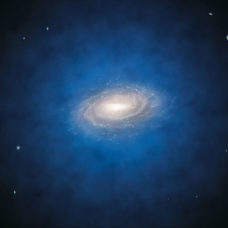Researchers just removed the dark energy theory in their new explanation of cosmic acceleration.
Since the discovery of our universe’s rapid expansion in the 1990s, space scientists theorized that dark energy affects cosmic acceleration. They even predicted that this mysterious force would soon engulf roughly 68 percent or more of our universe.
However, three mathematicians from the University of California at Davis and the University of Michigan offered a new explanation about the cosmos’ fast expansion without involving dark energy in the picture.
As you may know, the idea of dark energy was linked to Albert Einstein‘s famous Theory of General Relativity. In 1917, Einstein thought that the universe was static. So, to address the issue regarding the so-called vacuum energy, he added a cosmological constant to represent an anti-gravitational force.
However, when it was proven that the universe was indeed expanding, Einstein removed the constant from the equation and claimed that it was his greatest mistake. As you can see, even the world’s most celebrated genius committed blunders.
The question now is: how did the dark energy theory get into the picture?
Cosmic Acceleration and Dark Energy
Even though Einstein scrapped the cosmological constant from the Theory of General Relativity, it came back into the picture when modern astronomers started using it interchangeably with dark energy to explain cosmic acceleration. This didn’t sit well with mathematicians Blake Temple, Zake Vogler, and Joel Smoller.
In their paper published in the Proceedings of the Royal Society, the trio argued that dark energy holds no relevance now since the equations in Einstein’s original Theory of General Relativity were correct and were able to give the right predictions in every other context. Add to that the absence of evidence regarding the existence of dark energy, Temple questioned why a “fudge factor“ (dark energy or cosmological constant) must be added to an already correct equation.
“We set out to find the best explanation we could come up with for the anomalous acceleration of the galaxies within Einstein’s original theory without dark energy.” – Blake Temple
Temple and his colleagues further said that what requires adjustment is the idea that the cosmos is expanding uniformly. Apparently, cosmological models that originate from the “Friedmann universe” assumed that all matter is evenly distributed in space at any time.
The three mathematicians denounced this belief and further argued that Einstein’s equations have already shown that the Friedmann space-time is unstable. For instance, even the slightest deviation in the course of a celestial body or difference in density could push it over into cosmic acceleration.
As an example, Temple compared the scenario to an upside-down pendulum. “When a pendulum is hanging down, it is stable at its lowest point. Turn a rigid pendulum the other way, and it can balance if it is exactly centered—but any small gust will blow it off.”
The researchers said that since Friedmann universe is unstable, what scientists should be measuring are the local space-times that accelerate faster. Interestingly enough, Temple noted that the instability creates local space-times that are in the same range as the cosmic accelerations from dark energy theories.
According to Temple, this only means that cosmic acceleration has been predicted by the original theory of General Relativity without the dark energy in the picture.
“The math isn’t controversial, the instability isn’t controversial,” Temple said. “What we don’t know is, does our Milky Way galaxy lie near the center of a large under-density of matter in the universe.”



















Comments (0)
Most Recent